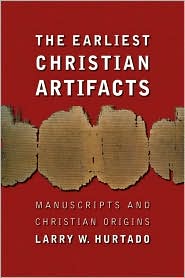
Okay, so it only just dawned on me.
From the preface of Larry Hurtado's The Earliest Christian Artifacts: Manuscripts and Christian Origins (Eerdmans, 2006):
When I was asked about what I was working on during my year-long research leave, and I responded that I was writing a book on the wider historical importance of early Christian manuscripts, the result was usually a blank stare, and a request to illustrate specifically what things I had in mind.
A blank stare was my reaction to seeing the book. Generally, I can't stop myself going after Huratdo's work. In fact, his work on early Christology is playing a big part in my definition of orthodoxy. However, the importance of the physical manuscripts is extremely important for the project I have embarked on. For example, much of my argument on orthodoxy and heresy in early Egypt is going to rely on the physical distribution and features of physical manuscripts within real time. As there is a general silence of sources (something I have to agree with Bauer on) we need to head off somewhere else for our 'educated' conjecture.
Anyway, it seems this book I first repulsed may very well play an important role!
Update: Michael F. Bird has an interesting article on "Textual Criticism and the Historical Jesus" in Journal for the Study of the Historical Jesus 6 (2008) 133–156. The abstract reads:
This study argues that historical Jesus research needs to pay greater attention to the fi eld of textual criticism and study of early Christian manuscripts. It is accordingly argued that the fi eld of textual criticism impacts historical Jesus studies in at least three ways: (1) the textual integrity of the New Testament and the possibility of historical Jesus research; (2) the significance of the agrapha ; and (3) text-critical contributions to historical issues in life of Jesus research.

manuscripts are neglected very often
ReplyDeleteWell, after all, we have Nestle Aland. Or for some people, Textus Receptus.
ReplyDeleteAll those fragments of papyri in run-on capitals are so much work, after all. So much easier to accept assured results of scholarship.
Chuck Grantham